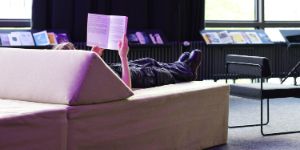
© Berliner Festspiele, photo: Dave Grossmann
Library of Jazzfest Berlin
The “Library” of Berliner Festspiele was conceived by the MaerzMusik Festival as a space for open exchange and the sharing of lived knowledge in its manifold media forms. The Library’s modular design, invented by Diogo Passarinho Studio, is integrated into the Festspielhaus’ architecture and can be flexibly adapted to the programme of the individual festivals. In this year’s edition, Jazzfest Berlin will also be inviting people to make themselves comfortable in the Library and discover multimedia offers related to the Festival’s topics and artists.
An installation offers insights into the musical universe of Henry Threadgill. A “Title Wall” with graphic representations of this Pulitzer prizewinning musician and composer’s album titles conceals interview recordings of Threadgill taken from the Library of Congress, as well as a listening station with a musical cross-section of Threadgill’s extensive and diverse work, curated by Brent Hayes Edwards, the co-author of Threadgill’s recently-published autobiography, “Easily Slip into Another World”.
Anyone who wants to browse through the latter can curl up in the Book Corner. As well as the latest publications from recent years in the fields of jazz and creative music, this corner will also provide tablets on which festival guests will be able to dive into the “story”, the online magazine of Jazzfest Berlin 2023, on the topic of “(Un-)Learning Jazz”.
A particular highlight is seeing musicians from this year’s programme in exclusive television recordings of historic Jazzfest concerts between 1973 and 1992, from the archives of the rbb – which back then was still known under the name of Sender Freies Berlin (SFB – “Free Berlin Channel”). These include, among others, Henry Threadgill’s first performance for the Berliner Jazztage (now Jazzfest Berlin) with the Muhal Richard Abrams Sextet (1973), as well as a concert of one of his own inventively orchestrated bands, Very Very Circus, in 1990. Andrew Cyrille reappears on the screen from the year 1975 – with the Cecil Taylor Unit, which at the time was announced as the “oldest still-extant ensemble from the heyday of Free Jazz” in the programme booklet of the festival. In addition, the archive will reveal a musical invasion of the Berliner Philharmonie by Alexander von Schlippenbach’s Globe Unity Orchestra as commissioned by the Berliner Jazztage 1976, as well as Aki Takase’s Jazzfest Berlin debut at the festival’s 1981 edition, with a Japanese trio. Last but not least, Fred Frith can be seen heading up a large ensemble with Que D'La Gueule at the JazzFest Berlin 1992 and even then the announcement read: “IF JAZZ WERE still jazz – Fred Frith would have no chance with us.”
The project "Library" was initiated by MaerzMusik, designed by Diogo Passarinho Studio and is funded by Hauptstadtkulturfonds.